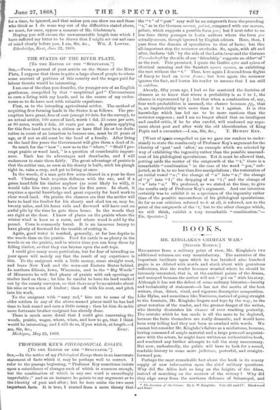PROFESSOR KEY'S PHILOLOGICAL ESSAYS. [To THE EDITOR OF THE "SPECTATOR."]
Sra,—In the notice of my Philological Essays there is an inaccurate statement of facts which it may be perhaps well to correct. I refer to the passage beginning, " Professor Key sometimes insists upon a coincidence of changes each of which is common enough, but the combination of which in any one word is exceedingly improbable ;" and as an instance he points to my argument as to the identity of post and after ; but he here omits the two most important facts. It is true, I started from a mere theory that
the " t " of " post" may well be an outgrowth from the preceding "s," as in the German morast, palast, compared with our morass, palace, which suggests a possible form pm ; but I next refer to no less than thirty passages in Latin authors where the form pos actually occurs, though ignored by English editors. Here, then, I pass from the domain of speculation to that of facts ; but this all-important step the reviewer overlooks. So, again, with aft and after, the form 'left' by the side of the Latin lasrus and the German Preundschafl by the side of our ' friendship' suggests an older"af " as the root. This premised, I quote the Gothic afar and afara of identical meaning and the Sanskrit apare apania, as exhibiting the root without the " t." Thus, here again I descend from flights of fancy to land on terra firma ; but here again the reviewer ignores the fact, and leaves his reader to assume that I am still in nubibus.
Already, fifty years ago, I had so far mastered the doctrine of chances as to know that where a probability is as 3 to 1, the chance is represented by ; but that when a combination of, say, four such probabilities is assumed, the chance becomes ,se,, that is, an improbability with more than 2 to 1 against. It is this knowledge which has led me to be more cautious than the reviewer supposes ; and I sin no longer afraid that an intelligent and candid critic, if he be also careful, will confound my argu- ment about post and after with the old identification of King Pepin and a cucumber.—I am, Sir, &c., T. HEwrrr KEY.
[Want of space compelled us (as we gave our readers to under- stand) to state the results only of Professor Key's argument for the identity of post' and ' after,' an example which we selected by way of exhibiting the ingenuity rather than the posaible unsound- ness of his philological speculations. Yet it must be allowed that, putting aside the matter of the outgrowth of the " t," there is a remarkable " combination " in the case of the word " pee," sub- jected, as it is, to no leas than five manipulations ; the restoration of an initial vowel " o ;" the change of " o " into " a ;" the change of " p" into " f ;" the dropping of an " i ;" and the change of " tr" into "o." We professed, as we stated at the time, to give the results only of Professor Key's argument. And our intention certainly was to exhibit it as a specimen of the ingenuity rather than of the possible unsoundness of his philological speculations. So far as our criticism referred to it at all, it referred, not to the point of the outgrowth of the t,' but to the other changes which, we still think, exhibit a very remarkable " combination."— En. Spectator.]






























 Previous page
Previous page